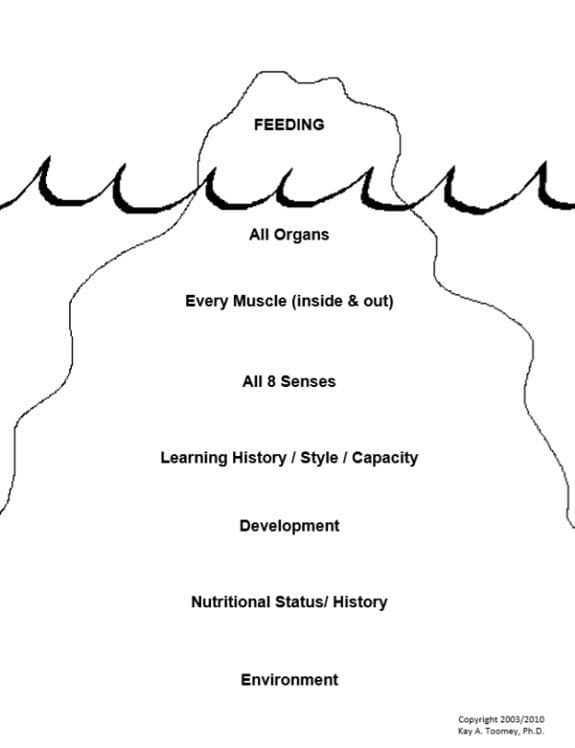
About Feeding and Swallowing Disorders
Feeding is a complex task that can be broken down into 32 different steps beginning with tolerating food in the room and ending with the food reaching your stomach. Throughout all of these steps, your body and sensory system have to stay regulated and supported.
Children need to learn this process and they usually start by sucking, before learning to eat solid foods or drink from a cup. Many children will have some trouble at first; drinks may spill from their mouths, they may gag on new foods, or push food back out of their mouth. This is normal behavior that usually goes away after a while; however, some children continue having trouble with the eating process and this is considered a feeding disorder. Feeding disorders can also present as your child eating only a limited number of foods, eating specific brand, color, or texture food items, problematic mealtime behaviors and tantruming (screaming, arching, running from the table, throwing food, etc), food refusals, sensory dysregulation during meals, or taking a long time to eat. Other children may have problems swallowing their food characterized by gagging, choking, vomiting, or coughing, which is known as dysphagia. In spite of how important feeding is to our everyday lives, research shows that 1 out of 5 kids struggles with eating at some point by the time they are 7 years old.
If your child does have a feeding disorder, or if you suspect they have a feeding disorder, the Raleigh feeding therapists at Developmental Therapy Associates are here to help. Contact us for a free screening or if you have questions about our feeding therapy services in Raleigh, Cary or Durham.

Feeding Therapy & Dysphagia Evaluation: Raleigh, Cary & Durham

During an evaluation your child’s feeding and swallowing abilities will be assessed by either a Speech Therapist or an Occupational Therapist. If you suspect both sensory regulation concerns and oral motor difficulties, special accommodations may be able to be made for both a Speech Therapist and Occupational Therapist to complete the evaluation together. An evaluation can help determine the root of your child’s feeding difficulties and the best treatment plan in order to aid with peaceful mealtimes and a healthy child. The therapist(s) will assess your child’s sensory systems, oral motor skills, overall muscle tone, positioning, respiration and phonation, etc.
Therapy is individualized to meet the needs of each patient and their family to maximize potential. Parents are encouraged to participate in sessions, carryover family meals and feeding activities into the home, and provide feedback in order to develop a meaningful partnership.
SOS Approach To Feeding
Developed by Dr. Kay Toomey over 30 years ago, the SOS (Sequential-Oral-Sensory) Approach to Feeding is an evidence-based program designed to systematically and effectively address problematic feeding. The SOS approach looks at feeding as a complex process through which the feeding problem is the tip of an iceberg. Everything under the water crashes the boat: Organ systems, Muscles (including oral motor), Sensory processing, Learning style, Behavior, Cognitive status, Developmental, Nutritional status, and Environment.

SOS utilizes “Play with a Purpose” in order to increase the child’s comfort with foods by exploring and learning about different properties (color, shape, texture, flavor, etc) of foods. Children are encouraged to interact with foods in a playful manner while working through the Steps to Eating in order to successfully build comfort, confidence, and exposure to a variety of foods!
Red Flags for Feeding Disorders
- Ongoing poor weight gain or weight loss
- Choking, gagging, or coughing during meals
- Frequent vomiting during or after meals
- History of traumatic choking incident
- History of coordinating eating and breathing with ongoing respiratory issues
- Complaints of being a “picky eater” for 2 or more well child checks
- Difficulty transitioning to baby food purees by 10 months old
- Difficulty accepting table food solids by 12 months old
- Difficulty transitioning from breast/bottle to cup by 16 months old
- Not weaned off baby foods by 16 months old
- Aversion or avoidance of all foods in a specific texture or nutrition group
- Less than 20 foods they will eat
- Infant who cries and/or arches at most meals
- Meal times feel like battles
- Parents repeatedly report that child is difficult to feed
IF YOUR CHILD HAS 4 OR MORE RED FLAGS, A FEEDING ASSESSMENT IS RECOMMENDED
